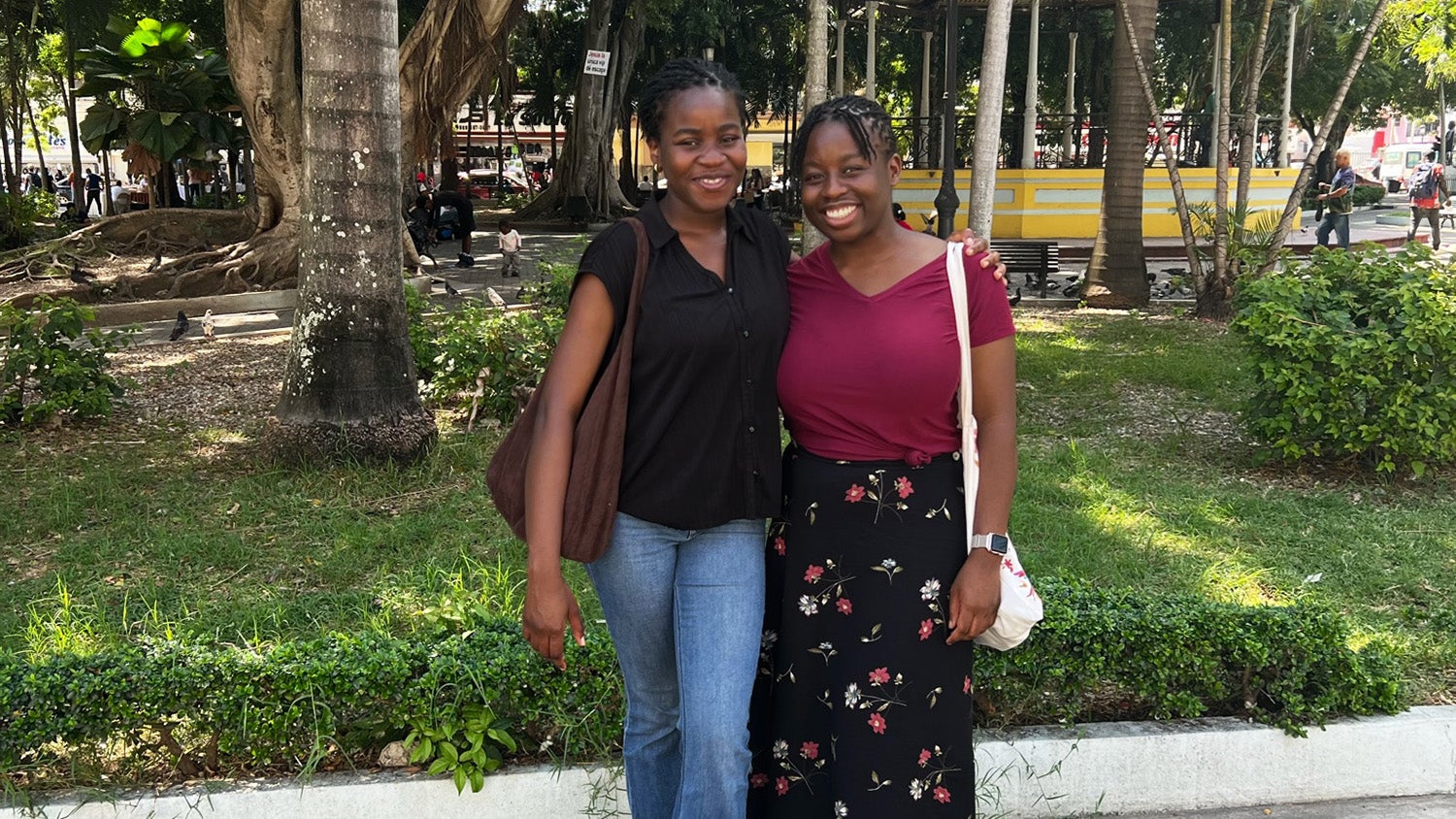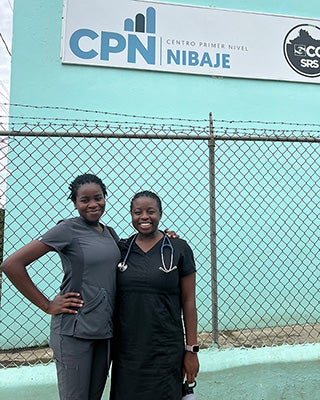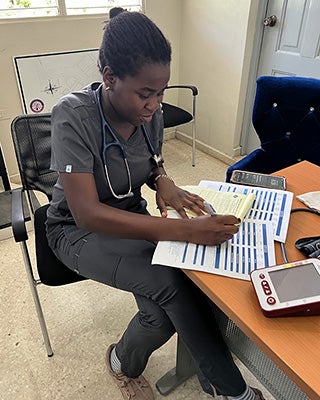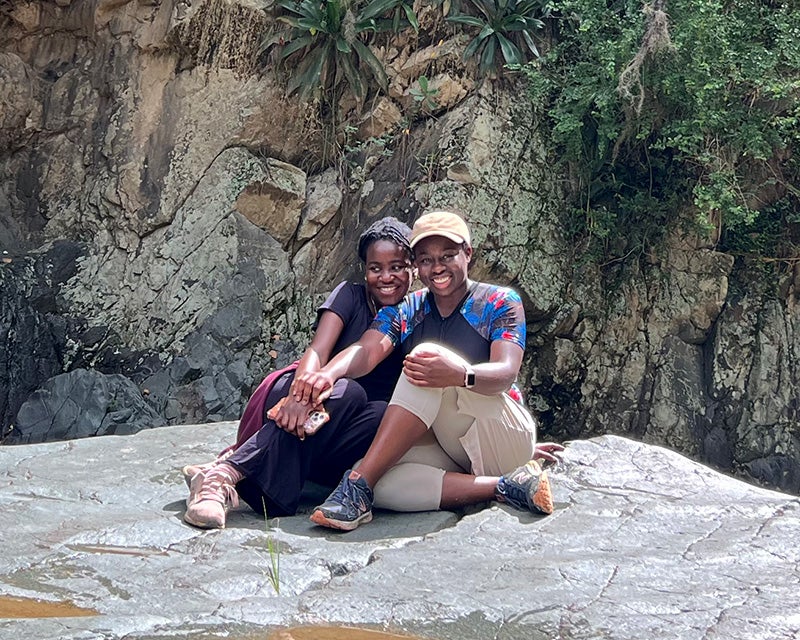Medical Students Gain Confidence with a Dose of Cultural Humility Through Summer Experience

Posted in News Stories | Tagged global health, medical education, population health, student experience
(July 26, 2024) — A monthlong medical mission to the Dominican Republic this summer was a valuable opportunity for two School of Medicine students to experience health care delivery in an under-resourced area of the world.

Phoebe Y. Ato (M’27, MBA’27) and Rukewe H. Kehinde (M’27) arrived in Santiago on June 14 for the four-week visit, joining other U.S. medical students in setting up pop-up clinics to provide basic medical care in Puerto Plata, working shifts in a hospital emergency room and providing care in public clinics.
The mission was organized by Creighton University and hosted by Misión ILAC.
Both said they gained confidence in their skills and deepened their understanding of cultural humility.
“Participating in this mission was profoundly humbling and transformative,” said Ato. “It emphasized the significant impact physicians can have on underserved communities, both internationally and domestically. It’s a reminder that equitable health care is a universal right, and every physician should strive to serve all patients with unwavering dedication, regardless of their circumstances.”
Kehinde said the mission strengthened lessons learned in medical school about the importance of cultural humility in medicine.
“True growth in cultural humility comes from engaging with diverse cultures,” she said. “I am deeply grateful for this experience, as it has provided me with the invaluable opportunity to immerse myself in and learn from different cultural perspectives.”
Ato and Kehinde offered these additional reflections about their impactful journey to the Dominican Republic.
Why did you choose to go?
Ato: I was drawn to this opportunity as part of my exploration into the type of physician I wanted to be and my interest in global health. It was a chance to step outside my comfort zone, engage with diverse communities, and learn from their experiences. Coming from a background of privilege in the United States, with access to advanced medical resources, I wanted to witness health care delivery in resource-limited settings and understand how medicine adapts to different contexts.
Kehinde: I participated in this experience driven by a strong desire to get out of my comfort zone, immerse myself in a different culture, and give back using the knowledge and clinical skills I had acquired during my first year of medical school. Recognizing it as a valuable volunteer opportunity, I believed it would be a meaningful and impactful way to spend my summer.

What experience impacted you the most?
Ato: It’s challenging to single out one specific moment, but what struck me profoundly was the warm reception we received as volunteers and the openness of the local people in sharing their personal stories. Each interaction, whether in clinic settings or with host families in various communities, left a lasting impression. Their hospitality and willingness to connect deeply with us were truly memorable.
Kehinde: The sheer kindness and hospitality of the people was by far the most impactful. I will always carry that with me.
What was unexpected?
Ato: I was pleasantly surprised by how eagerly people shared their personal stories and engaged with us. This openness contrasted with my expectations based on experiences in the United States, where such interactions can be more reserved. It reminded me of the universal human desire to be heard and understood.
Kehinde: One unexpected aspect of this experience was the depth of cultural understanding we gained and the significant improvement in our physical examination skills in the short time we were there. During the first week in the clinic, we would often feel uncertain, such as when checking lung sounds and identifying abnormalities. However, as time went on, our confidence in recognizing abnormal findings grew, and our skills became sharper. This experience underscores how invaluable hands-on practice is, especially in a field like medicine, where experience truly is the best teacher.

How does this experience inform your decision to become a physician?
Ato: This experience reinforced my commitment to pursuing a career in global health medicine. It highlighted the importance of cultural humility in medical practice, recognizing that patients come from diverse backgrounds with unique narratives. Understanding these cultural nuances is crucial in delivering effective and compassionate health care, regardless of geographic location or available resources.
Kehinde: This experience reaffirmed my decision to become a physician and strengthened my desire to impact people’s well-being. It highlighted the importance of truly listening to patients’ concerns, identifying potential root causes, and finding suitable solutions for them.
Additionally, it underscored the significant role of nonverbal communication in patient interactions. Due to the language barrier, nonverbal cues became more apparent, and the patients we saw in the clinic reported that, even when communication was challenging, they still felt seen and understood. They appreciated our genuine interest in their well-being and issues.
